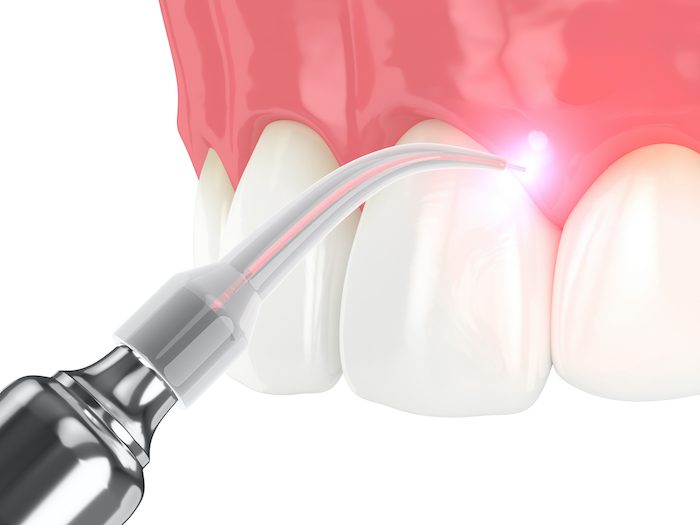Technology continues to advance faster and faster in the modern world. This goes for dental technology, too. At Mill Creek Dental, we want to stay on top of the latest treatments and techniques to provide the best care possible. Laser dentistry is a general dentistry service revolutionizing treatment, particularly for gum conditions. It makes treatment faster and more comfortable.
Laser Dentistry in Canton, TX
Laser dentistry has become increasingly popular as dentists realize the potential it can bring to their practice. Lasers can perform various treatments, eliminating the need for multiple solutions for different problems. Our office utilizes soft tissue lasers to treat issues with gums and lips.
Cosmetic Gum Procedures
When your smile is imbalanced, the soft tissue of the gums outweighs your teeth. This gives off the appearance of small teeth and a gummy smile. Laser dentistry is extremely precise, allowing us to contour gum tissue, exposing more of the tooth structure. It’s also helpful for uneven gumlines, where some teeth are more covered by gum tissue than others.
Gum Disease Treatment
One of the most common uses for dental lasers is treating gum disease. We can target bacteria and debris buildup in periodontal pockets with the laser’s light energy, which causes infections. If you already have damaged or diseased tissue, a dental laser can precisely target only the problem tissue, leaving all of the healthy tissue intact. It minimizes unneccesary damage, preventing the infection from spreading and promoting the healing process.
Frenectomies
The frenulum is the tissue that connects the tongue to the base of the mouth and the lip to the gums. Some people are born with frenulums that are too tight, restricting mouth and tongue movement. These conditions are known as tongue and lip ties. The laser cuts through the too-tight tissue, releasing it and restoring the full range of motion to the tongue and lips.
The Benefits of Laser Dentistry
Laser dentistry has various benefits that make it ideal compared to traditional methods. It’s incredibly precise, ensuring no healthy tissue around the treatment area is harmed. Many gum treatments require scalpels, causing more bleeding and a longer downtime after the procedure. With a laser, the energy cauterizes the area as it goes along, causing much less bleeding and no need for sutures.
Since there’s less bleeding, there is less downtime when the procedure is finished. Instead of multiple days of healing, you’ll feel pretty good right away. The energy ignites your body’s natural healing process, promoting clotting. Less trauma is done to the tissue, and there’s much less pain, too. Usually, we don’t even need to use a local anesthetic when we perform laser treatment. It’s very gentle and pleasant.
Particularly with gum disease cases, the laser sterilizes the area as it treats it. This prevents bacteria contamination and reduces the chance of further infection, ideal for patients with compromised immune systems. The clotting abilities benefit patients who are on blood thinners or have other blood conditions.
Frequently Asked Questions
We have answers to commonly asked questions patients have concerning dental lasers.
How long is the recovery time after laser gum surgery?
Recovery from laser gum surgery is usually faster than with traditional surgery. Most patients experience minimal swelling and soreness, with full healing typically occurring within one to two weeks. Following your dentist’s post-care instructions ensures the best recovery.
Can laser dentistry reduce the risk of infection?
Yes, laser dentistry often reduces the risk of infection compared to traditional methods. The precision of a laser targets diseased tissue while sparing healthy areas, limiting open wounds. With less bleeding and fewer cuts, there’s less opportunity for bacteria to invade.
Does insurance cover laser dentistry?
Insurance coverage for laser dentistry depends on the procedure and your specific plan. Medically necessary treatments, such as gum disease therapy, are more likely to be covered than cosmetic procedures. Check with your provider for details.
Are dental lasers safe for children?
Dental lasers are safe for children and are often used for procedures like frenectomies or cavity removal. Lasers can reduce anxiety in young patients by eliminating the need for drills and minimizing discomfort.
Can dental hygienists use lasers?
Yes, dental hygienists can use lasers, but with important limitations. Their ability to use laser technology depends on state regulations, specific professional certifications, and additional specialized training they may have completed. In some regions, dental hygienists can use lasers for certain procedures, but it depends on local regulations and their level of training.
Will I need anesthesia for laser dental procedures?
Most laser dental procedures don’t require anesthesia because lasers cause less pain and discomfort compared to traditional methods. The precision of the laser minimizes damage to surrounding tissues and reduces the need for numbing agents. However, for more extensive procedures or patients with sensitivity, we may use a local anesthetic to ensure comfort.
Schedule an Appointment
Laser dentistry may be able to provide better dental care for your needs. Call us or schedule an appointment online.
